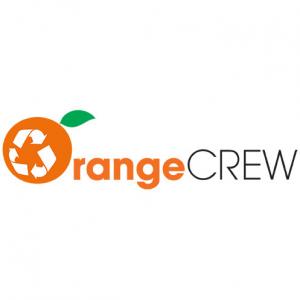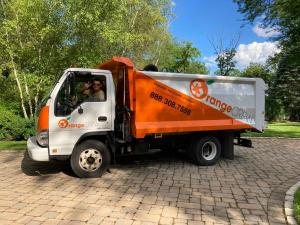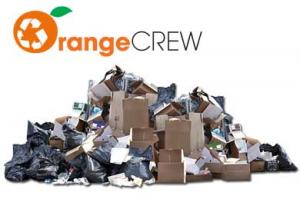Chicago Orange Crew Expands Commercial Junk Removal Capabilities to Meet Regional Needs
Orange Crew expands commercial junk removal services in Chicago to meet rising demand for large-scale hauling, appliance removal, and waste compliance.
The move follows sustained growth in waste output associated with commercial renovations, retail relocations, equipment replacement, and post-construction cleanups—sectors that have all seen elevated activity over the past 18 months. Orange Crew’s expansion includes upgraded logistical capabilities, new disposal partnerships, and updated safety protocols designed to support larger, more complex project scopes.
“Chicago’s commercial infrastructure is constantly evolving, and with that comes a continuous need for efficient, compliant, and scalable waste disposal services,” said George Dim, President of Orange Crew. “Our expanded operations allow us to better serve clients that manage multiple properties or require fast turnaround on-site.”
The demand for junk haulers in commercial settings has grown in tandem with broader economic activity and real estate turnover. Industries ranging from healthcare and retail to education and logistics frequently require rapid clearance of materials no longer in use, including office furnishings, non-functioning machinery, outdated signage, and surplus building supplies. Orange Crew’s service model now incorporates faster response times, extended hours, and dedicated account coordination to meet the expectations of commercial clients across the Chicago metropolitan area.
One of the most frequently requested services under the new expansion is appliance removal, particularly from large-scale developments, hotels, and food service operations undergoing upgrades. Older refrigerators, ovens, and HVAC units require careful extraction and environmentally responsible disposal to comply with local and federal environmental guidelines. Orange Crew has implemented updated training protocols to ensure safe handling of these items, including refrigerant recovery and e-waste sorting where applicable.
Commercial junk removal requires a different logistical approach compared to residential cleanouts. Variables such as loading dock access, volume forecasting, safety zoning, and regulatory compliance all play a larger role in scheduling and execution. Orange Crew’s revised commercial process includes pre-project assessments and debris classification to determine proper disposal channels and resource allocation.
“Our crews are trained to operate within active work environments where safety, speed, and discretion matter,” Dim noted. “This includes after-hours pickups, multi-phase projects, and coordination with on-site contractors or facility managers.”
Orange Crew’s expanded fleet now includes roll-off trucks, box trucks, and flatbeds capable of handling bulk and irregular loads. These resources are supported by GPS dispatching, load documentation tools, and real-time customer communication to streamline service delivery and ensure transparency from initial estimate to project completion.
The company has also increased staffing across key operational roles, including drivers, field technicians, and customer service representatives. New hires undergo orientation and safety training specific to commercial job sites, including protocols for lifting, hazardous materials recognition, and interaction with public access areas.
This workforce expansion is timed to coincide with Chicago’s seasonal construction uptick and the scheduling of fiscal-year-end facility upgrades common in education, government, and private industry. According to data from the U.S. Environmental Protection Agency and the National Association of Home Builders, commercial renovation and redevelopment contribute significantly to the volume of reusable and non-reusable material waste generated annually in urban centers.
Orange Crew’s disposal philosophy incorporates a diversion-first model, where materials are sorted to maximize reuse, donation, or recycling before resorting to landfill. Office equipment, wood scraps, metal shelving, and certain appliances are routed through recycling centers or donation partnerships where applicable, supporting waste reduction goals aligned with regional sustainability initiatives.
“Responsible junk removal is about more than clearing space—it’s about managing material lifecycles,” Dim said. “Businesses and public institutions are increasingly looking for partners who can help them meet both operational and environmental targets.”
Search trends across northern Illinois show an increase in queries for terms like “junk removal” and “junk haulers,” especially in commercial real estate listings and business relocation planning tools. This suggests that facility managers are incorporating cleanup logistics earlier in the transition or upgrade process, requiring service providers to be flexible and responsive.
Orange Crew’s commercial service areas now include the greater Chicago metro, encompassing Cook, Lake, and DuPage counties, with on-demand and scheduled options available. Service lines cover warehouse cleanouts, office clearances, retail renovations, educational facility transitions, and contractor debris removal. Specialized disposal solutions are available for items with compliance sensitivities, such as electronics and bulk appliances.
In the context of real estate and property management, junk removal is a critical step in preparing commercial spaces for sale, lease, or turnover. Leftover equipment, display units, and construction debris can delay project timelines, trigger penalties, or result in safety citations. Orange Crew’s goal is to reduce those risks through timely service, detailed reporting, and adherence to disposal regulations.
The company’s updated commercial offerings also include site-specific documentation and waste tracking when required. This is particularly useful for LEED-certified projects or clients participating in green building initiatives that require verified data on material diversion rates.
As urban density and commercial development continue to grow in the Chicago region, Orange Crew plans to further invest in technology and regional partnerships to support responsible and efficient waste handling.
About Orange Crew
Orange Crew is a Chicago-based junk removal company providing commercial and residential services across northern Illinois. The company offers a range of hauling and disposal solutions, including appliance removal, construction debris clearing, office cleanouts, and estate cleanouts. Known for its commitment to safety, environmental responsibility, and logistical precision, Orange Crew serves clients in both the public and private sectors.
For more information, service inquiries, or media requests, contact:
Media Contact:
George Dim
President
Orange Crew – Chicago
Phone: +17739971880
Email: info@orangecrewchicago.com
Website: www.orangecrewchicago.com
George Dim
Orange Crew Chicago
+1 888-308-7556
info|orangecrewchicago.com| |info|orangecrewchicago.com
Visit us on social media:
Facebook
YouTube
X
Legal Disclaimer:
EIN Presswire provides this news content "as is" without warranty of any kind. We do not accept any responsibility or liability for the accuracy, content, images, videos, licenses, completeness, legality, or reliability of the information contained in this article. If you have any complaints or copyright issues related to this article, kindly contact the author above.
Wytrwal Industries Celebrates 250 years of the U.S. Army
WHAT by Anthony Prebor Expands the Acclaimed ?: QUESTION Mystery Series
DRML Miner Expands Cloud Mining Services with Sustainable Infrastructure and Flexible Contracts
Kalendarium
Więcej ważnych informacji
 Jedynka Newserii
Jedynka Newserii

 Jedynka Newserii
Jedynka Newserii

Prawo

Trwają dyskusje nad kształtem unijnego budżetu na lata 2028–2034. Mogą być rozbieżności w kwestii Funduszu Spójności czy dopłat dla rolników
Trwają prace nad wieloletnimi unijnymi ramami finansowymi (WRF), które określą priorytety wydatków UE na lata 2028–2034. W maju Parlament Europejski przegłosował rezolucję w sprawie swojego stanowiska w tej sprawie. Postulaty europarlamentarzystów mają zostać uwzględnione we wniosku Komisji Europejskiej w sprawie WRF, który zostanie opublikowany w lipcu 2025 roku. Wciąż jednak nie ma zgody miedzy państwami członkowskimi, m.in. w zakresie Funduszu Spójności czy budżetu na rolnictwo.
Konsument
35 proc. gospodarstw domowych nie stać na zakup mieszkania nawet na kredyt. Pomóc może wsparcie budownictwa społecznego i uwolnienie gruntów pod zabudowę

W Polsce co roku oddaje się do użytku ok. 200 tys. mieszkań, co oznacza, że w ciągu dekady teoretycznie potrzeby mieszkaniowe społeczeństwa mogłyby zostać zaspokojone. Jednak większość lokali budują deweloperzy na sprzedaż, a 35 proc. gospodarstw domowych nie stać na zakup nawet za pomocą kredytu. Jednocześnie ta grupa zarabia za dużo, by korzystać z mieszkania socjalnego i komunalnego. Zdaniem prof. Bartłomieja Marony z UEK zmniejszeniu skali problemu zaradzić może wyłącznie większa skala budownictwa społecznego zamiast wspierania kolejnymi programami zaciągania kredytów.
Problemy społeczne
Hejt w sieci dotyka coraz więcej dzieci w wieku szkolnym. Rzadko mówią o tym dorosłym

Coraz większa grupa dzieci zaczyna korzystać z internetu już w wieku siedmiu–ośmiu lat – wynika z raportu NASK „Nastolatki 3.0”. Wtedy też stykają się po raz pierwszy z hejtem, którego jest coraz więcej w mediach społecznościowych. Według raportu NASK ponad 2/3 młodych internautów uważa, że mowa nienawiści jest największym problemem w sieci. Co więcej, dzieci rzadko mówią o takich incydentach dorosłym, dlatego tym istotniejsze są narzędzia technologiczne służące ochronie najmłodszych.
Partner serwisu
Szkolenia

Akademia Newserii
Akademia Newserii to projekt, w ramach którego najlepsi polscy dziennikarze biznesowi, giełdowi oraz lifestylowi, a także szkoleniowcy z wieloletnim doświadczeniem dzielą się swoją wiedzą nt. pracy z mediami.












.gif)

 |
| |
| |
|